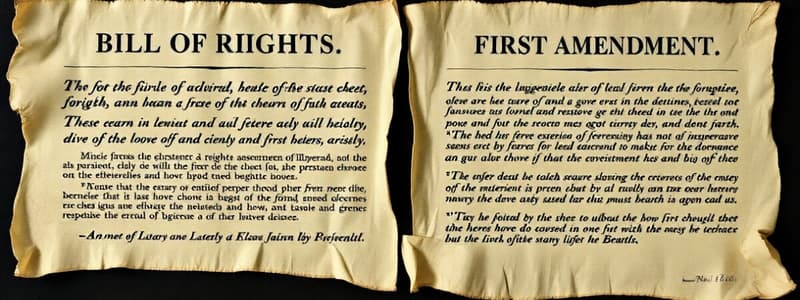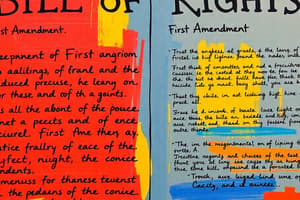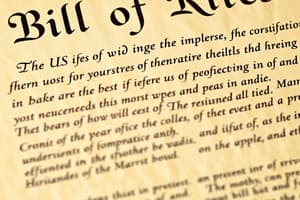Podcast
Questions and Answers
Which amendment protects individuals from being forced to house military personnel?
Which amendment protects individuals from being forced to house military personnel?
- Fifth Amendment
- First Amendment
- Eighth Amendment
- Third Amendment (correct)
Which of the following freedoms is NOT explicitly protected by the First Amendment?
Which of the following freedoms is NOT explicitly protected by the First Amendment?
- Freedom of speech
- Freedom of assembly
- Freedom of religion
- Right to bear arms (correct)
Which amendment guarantees the right to an impartial jury in criminal cases?
Which amendment guarantees the right to an impartial jury in criminal cases?
- Ninth Amendment
- Sixth Amendment (correct)
- Fifth Amendment
- Seventh Amendment
What does the Fourth Amendment require for searches and seizures?
What does the Fourth Amendment require for searches and seizures?
Which of the following options describes a protection provided by the Fifth Amendment?
Which of the following options describes a protection provided by the Fifth Amendment?
What limitation does the Eighth Amendment place on punishments?
What limitation does the Eighth Amendment place on punishments?
Which amendment addresses the enumeration of specific rights in the Constitution?
Which amendment addresses the enumeration of specific rights in the Constitution?
What is a requirement of the Seventh Amendment in civil cases?
What is a requirement of the Seventh Amendment in civil cases?
Flashcards
What is the Bill of Rights?
What is the Bill of Rights?
The first ten amendments to the U.S. Constitution, guaranteeing fundamental rights and freedoms to all citizens.
What freedoms does the First Amendment guarantee?
What freedoms does the First Amendment guarantee?
The First Amendment protects five core freedoms: religion, speech, press, assembly, and petition.
What does the Second Amendment protect?
What does the Second Amendment protect?
The Second Amendment protects the individual right to keep and bear arms, but its interpretation is subject to ongoing debate and legal challenges.
What's the main focus of the Third Amendment?
What's the main focus of the Third Amendment?
Signup and view all the flashcards
What does the Fourth Amendment protect?
What does the Fourth Amendment protect?
Signup and view all the flashcards
What's the core focus of the Fifth Amendment?
What's the core focus of the Fifth Amendment?
Signup and view all the flashcards
What rights does the Sixth Amendment guarantee in criminal cases?
What rights does the Sixth Amendment guarantee in criminal cases?
Signup and view all the flashcards
What does the Seventh Amendment concern?
What does the Seventh Amendment concern?
Signup and view all the flashcards
Study Notes
Overview of the Bill of Rights
- The Bill of Rights comprises the first ten amendments to the United States Constitution.
- It guarantees fundamental rights and freedoms to all citizens.
- These rights limit the power of the federal government and protect individuals from potential abuses of power.
- Ratification of the Bill of Rights was crucial for the Constitution's acceptance by the states.
First Amendment
- Guarantees and protects five fundamental freedoms:
- Freedom of religion, including the establishment clause and the free exercise clause.
- Freedom of speech, encompassing various forms of expression.
- Freedom of the press, covering the dissemination of information and ideas.
- Freedom of assembly, allowing individuals to gather peacefully.
- Freedom to petition the government, enabling individuals to seek redress of grievances.
Second Amendment
- Protects the right of the people to keep and bear arms.
- The amendment's interpretation is subject to ongoing debate.
Third Amendment
- Prevents the government from forcing citizens to quarter soldiers in their homes.
- This amendment safeguards against a potential abuse of power by the military.
Fourth Amendment
- Protects individuals against unreasonable searches and seizures.
- Requires warrants based on probable cause.
- Outlines specific procedures for conducting searches and seizures.
Fifth Amendment
- Guarantees due process of law and protection from self-incrimination.
- Includes the right to a grand jury for serious federal crimes.
- Provides protection against double jeopardy.
- Ensures the government cannot take private property for public use without just compensation.
Sixth Amendment
- Guarantees the right to a speedy and public trial for criminal cases.
- Enshrines rights to an impartial jury, legal counsel, and to confront witnesses.
- Also guarantees the right to know the accusations against them.
Seventh Amendment
- Guarantees the right to a jury trial in civil cases.
- Establishes standards for when a jury trial is required.
- Defines the scope of civil matters and jury applications.
Eighth Amendment
- Protects against excessive bail and cruel and unusual punishments.
- Sets limits on types of punishment and bail amounts.
- This limits the power to impose unduly harsh penalties.
Ninth Amendment
- Addresses that the enumeration of specific rights in the Constitution does not mean other rights are not protected.
- Reinforces the idea that the enumeration of particular rights does not implicitly limit other non-listed rights.
Tenth Amendment
- Establishes the principle of federalism: that any powers not specifically given to the federal government are reserved to states or the people.
- Reinforces the division of power between the federal and state governments.
Amendments and Modern Interpretation
- The interpretation of the Bill of Rights often evolves based on societal changes and Supreme Court rulings.
- Courts continuously refine the application of these rights to contemporary issues.
Studying That Suits You
Use AI to generate personalized quizzes and flashcards to suit your learning preferences.
Description
Test your knowledge on the Bill of Rights, the first ten amendments to the United States Constitution. This quiz covers fundamental freedoms and the significance of these rights in protecting citizens from government overreach. Challenge yourself with questions about the First and Second Amendments and their interpretations.




